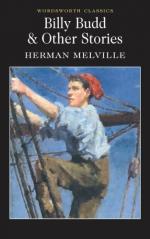|
|
Billy Budd Author/Context
Herman Melville was born August 1, 1819, to a wealthy merchant family in New York City. His family was as close to aristocracy as the young nation possessed (his paternal grandfather had participated in the Boston Tea Party). Melville was the third of many children in the family. When his father went bankrupt and died soon after, his older brothers took over the household. Because of these financial drawbacks, Melville ended up working at a bank at a young age and then on a farm with his uncle. In 1839, while he was studying to enter a job on the Erie canal, he published his first compositions. For the next decade, he went to sea on various voyages, the longest being several years. During this time he was inspired to write down his observations and experiences. His first book, Typee, was published in the summer of 1846, and his second book followed the next year. He married soon after this and had a child within a couple of years. After some financial troubles he returned to New York to live. For many years after this, depression and illness prevented him from any serious work. He worked on Billy Budd in the later years of his life and died in 1891 leaving it in a tin box, unpublished. At his death, Melville was nearly unknown as a writer.
Melville is remembered chiefly for his work Moby Dick, written as a combination of his experiences. This book, published in 1851 after two years of work, was received well by some critics, but coolly by most. His was a friend of Nathaniel Hawthorne, who praised Moby Dick as Melville's greatest accomplishment. Hawthorne and Melville were associates for many years, often reviewing and editing each other's works.
Melville's works endured after the turn of the century mainly because of Moby Dick. The lengthy epic about one man's insane hunt for the great white whale had been a cornerstone of American literature for the past hundred years. Its elaborate descriptions of whaling and in depth religious allusions have marked it as an indispensable part of American heritage.
Billy Budd is the last work of significance by Melville. His cousin had proceeded over the court-martial and hanging of a man in the U.S. Navy. Right before he was executed, the man yelled a blessing to the American flag. Details from this event inspired the increasingly religious Melville later in his life to write Billy Budd. The novel was first published in 1924, a generation after his death. Found by a scholar, this work was immediately praised as second only to Moby Dick. Biographer David Kirby says, "Billy Budd also anticipates modernism in its form, its collage of genres, and its open-endedness." Biographer Tyrus Hillway adds, "With stunning brilliance it throws the pure beam of its lightning - if only for an instant - upon the warp and woof of human existence."
Along with Twain and Hawthorne, Melville marks the advent of the American novel. He also occupies a post as a founder of American individualism and intellectualism along with Whitman, Emerson and Thoreau. In this era of authors, we see the American language and value system codified in literature. These authors set the convention for American novelists well into the 20th century writing novels about Americans in America. This tradition endures in schools and libraries today. Although Melville was called crazy in his day, Kirby asserts that "In the present day, given the richness, subtlety, and balance of Melville's vision, one might say there were few as sane as he was and, given the challenges he face[d], as brave."
Bibliography
Arvin, Newton. Herman Melville. New York: William Sloane Associates, 1950.
Hillway, Tyrus. Herman Melville. Boston: Twayne Publishers, 1979.
Kirby, David. Herman Melville. New York: Continuum, 1993.
Melville, Herman. The Great Short Works of Herman Melville. "Billy Budd". Walter Berthoff, ed. New York: Harper and Row, 1969.




